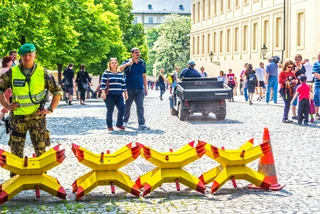Refusal to release report on PM-related case was unlawful
The Czech Finance Ministry's decision not to release the European Anti-Fraud Office's (OLAF) report on the Čapí hnízdo case, in which PM Andrej Babiš is suspected of EU- subsidy fraud, to those who asked for it was unlawful, the Prague Municipal Court ruled Monday. The court canceled the ministry's decision and returned the case to further processing. The Finance Ministry previously argued that it had not released the OLAF report because it did not want to harm the Czech criminal proceedings. The Kverulant NGO, whose complaint the court supported, claimed that the ministry had not provided the report to protect the interest of Babiš. The ministry said Monday that it had cooperated fully with the demands of the European Commission and the Municipal State Attorney's Office, under which the publication of the complete report would be inadmissible in view of the ongoing investigation. Ministry spokesman Michal Zurovec said the office would now wait for the written court verdict and its justification. The police launched prosecution against Babiš and several other suspects, including the PM's family members, in late 2017.
PARTNER ARTICLE
Child survivor of 1942 Lidice obliteration dies at 88
Marie Šupíková, 88, who as a child survived the Nazi obliteration of the Lidice village in 1942, died on Monday night, Lidice Memorial director Eduard Stehlík told CTK. Šupíková was one of the most active survivors. She attended public debates until the beginning of the coronavirus pandemic, telling young generations about the war atrocities and her experience, he added. Šupíková was one of the few Lidice children who were sent for re-education to German families. Under a new name, she first lived in Poland and then in Germany. She returned to Czechoslovakia after the war in 1946 and met her mother who died at the end of the same year as a consequence of her imprisonment in a concentration camp. Her father was executed by the Nazis.
Šupíková, who had overcome the COVID-19 infection and was vaccinated, died of non-COVID-related health troubles, said Stehlík, who was her friend for more than 30 years. Lidice, a village with some 500 inhabitants, was razed to the ground on June 10, 1942, in retaliation for the killing of high-ranking Nazi officer Reinhard Heydrich by Czechoslovak paratroopers in May 1942. All 173 men were executed directly in Lidice and another 26 inhabitants were shot dead later in Prague. Women and children were sent to concentration camps, while some of the children were selected for re-education in Germany. Fifty-three women died in the camps and 82 Lidice children were killed by gas. After the war, only 143 women and 17 children returned to the country. At present, only the last surviving Lidice woman, Jaroslava Skleničková, and a few "Lidice children" are still alive.
Czech population sees highest number of deceased since 1987
The Czech Republic saw 129,289 deaths and 110,200 births in 2020, which was its highest natural population decrease since 2000, the Czech Statistical Office (CSU) said in a report released on its website Monday. The number of deceased was the highest since 1987 and showed a 15-percent increase year-on-year. The increase was highest among those in their late 70s and early 80s. The CSU said the negative population change was due to a high number of deaths in 2020, while a similar natural population decrease in the late 1990s was caused by a sharp drop in the number of births.
Last year, the number of deaths was 16,900 higher than in 2019. Almost the whole year-on-year increase in deaths (15,700) concerned the last quarter of 2020. The mortality was the highest in November (15,800), October (14,200), and December (14,200). The number of deaths increased the most in the Zlín Region, by 24 percent year-on-year. According to the CSU, this region had one of the highest average ages in the Czech Republic.
Slavia Prague vows to respect outcome of racism investigations
— SK Slavia Prague EN (@slavia_eng) March 22, 2021
Slavia Prague has said it will respect the outcome of investigations into their dispute with the Rangers – and take action if necessary. The club has denied racism accusations against its player Ondřej Kúdela, and accused his alleged victim, Gers midfielder Glen Kamara, of punching Kúdela after the Europa League game on Thursday. Kamara claimed Kúdela's version of events was a “complete and utter lie” and added that Gers team-mate Bongani Zungu heard what the Slavia player said. A statement published on Slavia’s Twitter account reads: “Everything that happened in Glasgow is now being examined by UEFA and – on our initiative – by Scottish police.
40,000 ducks culled following Czech farm outbreak
Czech authorities culled 40,000 ducks on a farm where the disease has been found on Monday. Since the beginning of the year, there have been outbreaks of bird flu on poultry farms in various regions throughout the country. Veterinary authorities have also identified bird flu in wild birds in the Czech Republic. Czech authorities have introduced safety procedures for poultry farmers across the country as well as cautioning them to keep their farm-raised animals away from wild birds. Bird flu can spread among wild bird populations, to farms, then from one farm to another which can eventually threaten the commercial poultry sector.












 Reading time: 4 minutes
Reading time: 4 minutes 

































